Read Product Review CyberServe Ryzen RY1-104
A core-heavy Ryzen rack server at an entry-level price
Dave Mitchell April 01, 2024 |
Configure From $8,558.90 or Configure
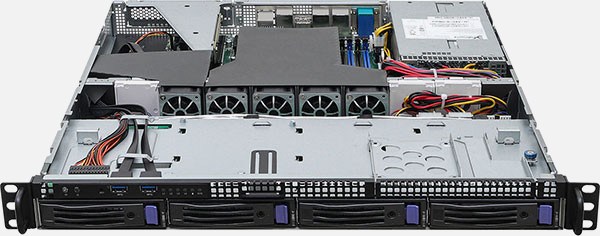
A core-heavy Ryzen rack server at an entry-level price
Dave Mitchell April 01, 2024 |
Configure From $8,558.90 or Configure


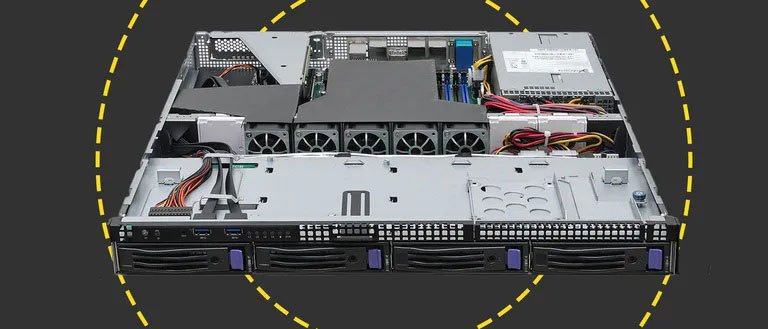
SMBs seeking an affordable single-socket rack server have traditionally chosen models with Intel's Xeon E CPUs but Broadberry Data Systems is offering a far more tempting proposition. AMD has been busy of late promoting its Ryzen CPUs as a more powerful and cost-effective alternative and Broadberry's CyberServe Ryzen RY1-104 shows this philosophy off to a tee.
Presented as a compact 1U rack system, the CyberServe sports a stonking great 16-core 4.5GHz AMD Ryzen 9 7950X CPU. Broadberry sweetens the deal further as the price includes the maximum 128GB of fast server-grade DDR5 ECC memory.
Intel's E-2400 CPU family tops out at eight cores and 3.2GHz so to get close to the Ryzen, you'll have to consider a high-end Xeon Scalable Silver or mid-range Gold CPU. These are around twice the price of a core-equivalent Ryzen and you'll also have to consider the fact that most servers supporting Xeon Scalable CPUs aren't aimed at small businesses and will have a premium price tag.
The CyberServe showcases ASRock's 1U4LW-B650/2L2T RPSU rack platform. This Taiwanese company has solid credentials as it started manufacturing server motherboards around ten years ago and has built up an impressively large Ampere, Intel, and AMD rack system portfolio.
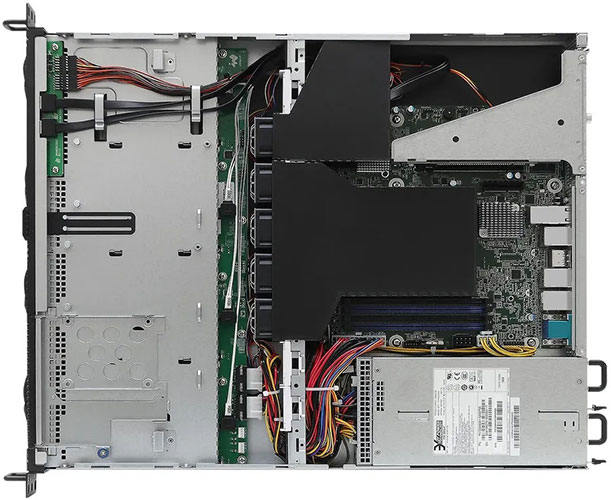
The CyberServe chassis is very solidly constructed and removing the lid reveals a smartly designed and tidy interior affording easy access for upgrades and maintenance. The Ryzen CPU is topped off with a chunky passive heatsink and flanked on one side by four DIMM slots with each occupied by 32GB DDR5 UDIMM modules.
All chassis cooling is handled by a bank of five dual-rotor fans in front of the motherboard with lightweight plastic air shrouds to direct air over the CPU and expansion bay. The Ryzen CPU loses out to the Xeon E-2400 alternatives as it has a much higher 170W TDP but we found the fans handled its demands well with noise levels low enough not to cause any concern in small office spaces.
Network connections are plentiful as the rear panel presents pairs of embedded Gigabit and 10GbE RJ-45 ports plus a dedicated Gigabit port for the server's IPMI controller. There's room to expand further as the motherboard's riser card provides a single full-height PCIe Gen4 slot.
You're spoilt for choice if you want to connect a local monitor as the server offers VGA, DisplayPort, and HDMI interfaces. Power redundancy is present and correct too, as the price includes dual hot-plug 450W PSUs.
Standard storage features are fairly basic with the four hot-swap drive interfaces on the backplane cabled directly to the motherboard's embedded SATA ports. These are presented to the resident OS as individual drives and we popped in a couple of SATA HDDs and used the Windows Server 2022 Storage Pools feature to create a software-managed RAID1 array.
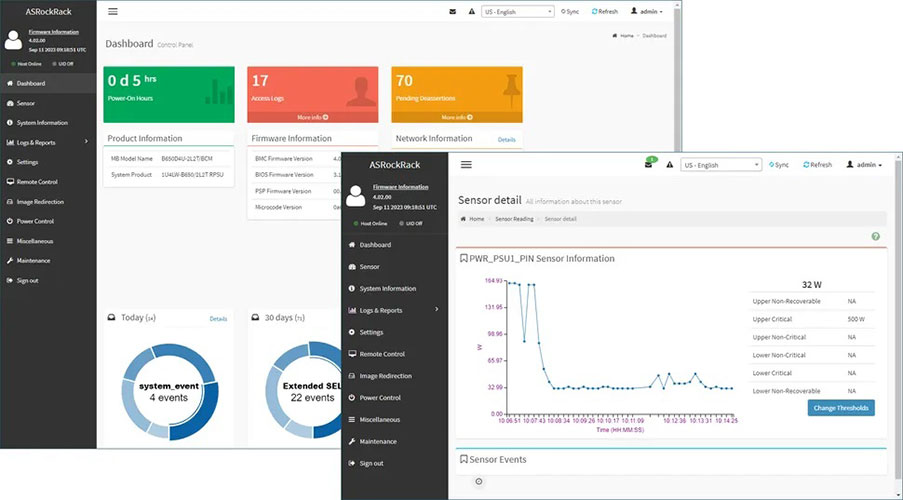
The motherboard lacks an integral RAID controller but the backplane is SAS-ready so you can add a suitable controller card to enable support. Broadberry offers a good range of Broadcom SATA/SAS3 adapters with the 9580-8i8e supporting all the usual RAID array suspects and fitted with 8GB of cache memory.
Drives are easily added by snapping them into ASRock's tool-free carriers and it's worth noting that unlike the blue-chips, Broadberry allows you to install your own choice of storage devices without invalidating the warranty. The motherboard also has a single M.2 2280 PCIe Gen5 slot and the price includes a big 2TB Corsair MP700 Pro NVMe SSD.
The server's embedded AST2600 IPMI controller and dedicated Gigabit port offer a tidy web interface packed with plenty of information on system health and critical components. It isn't as feature-rich as Dell's iDRAC9 or HPE's ILO6 but its dashboard provides an overview of all the latest events and you can pull up graphs of hardware sensor data, define thresholds for each one and link them up with email alerts if any are breached.
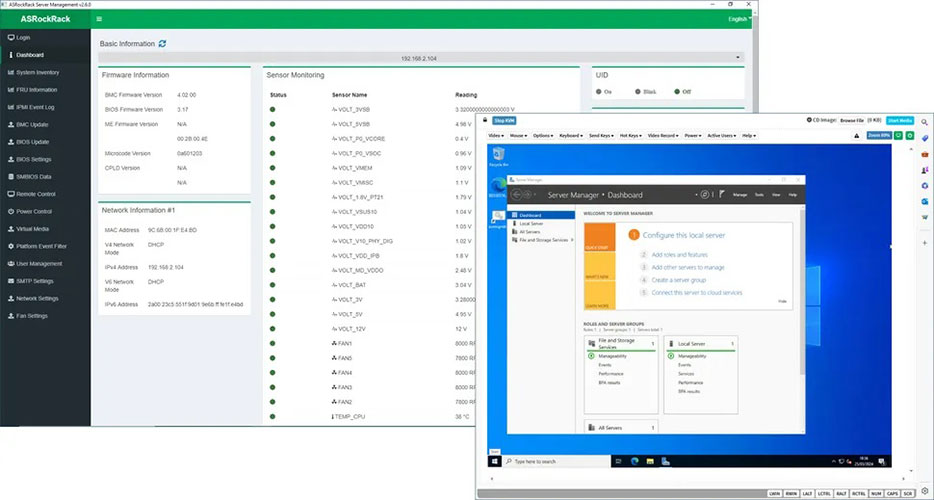
Firmware upgrade tools are provided along with remote power controls and the controller's built-in firewall provides options to create basic, advanced, or expert protection profiles. Unlike Dell and HPE, the IPMI controller includes full OS remote control and virtual media services as standard features and not as chargeable license upgrades.
The free ASRockRack Server Management tool can be used to manage multiple ASRock servers from a single console and we had no problems installing it on a Windows Server 2022 host. Its network discovery tool found the CyberServe's IPMI controller and the dashboard page presented details on its firmware version and a table of all hardware sensors with their current values.
It doesn't offer hardware inventory but you can control the server's power, fire up remote control sessions using its HTML5 viewer, and assign virtual media. Firmware upgrade tools for the BMC and server BIOS are provided and its PEF (platform event filter) service allows you to link alerts such as a sensor breaching its thresholds with SNMP traps and emails.
| System | 1U ASRock 1U4LW-B650/2L2T RPSU |
| Motherboard | ASRock B650D4U-2L2T/BCM |
| CPU | 16-core 4.5GHz AMD Ryzen 9 7950X |
| Memory | 128GB 4,800MT/s DDR5 ECC (max 128GB) |
| Storage bays | 4 x LFF/SFF hot-swap drive bays |
| Other storage | 1 x M.2 2280 PCIe Gen5 slot |
| RAID | Optional SATA/SAS HBA |
| Storage included | 1 x 2TB Corsair MP700 PRO Gen5 M.2 NVMe SSD |
| Network | 2 x Gigabit, 2 x 10GbE RJ45 |
| Expansion | 1 x PCIe Gen4 slot |
| Power | 2 x 450W hot-plug PSUs |
| Management | Aspeed AST2600 BMC with Gigabit, ASRockRack Server Management |
| Warranty | 3yrs Advanced Replacement |